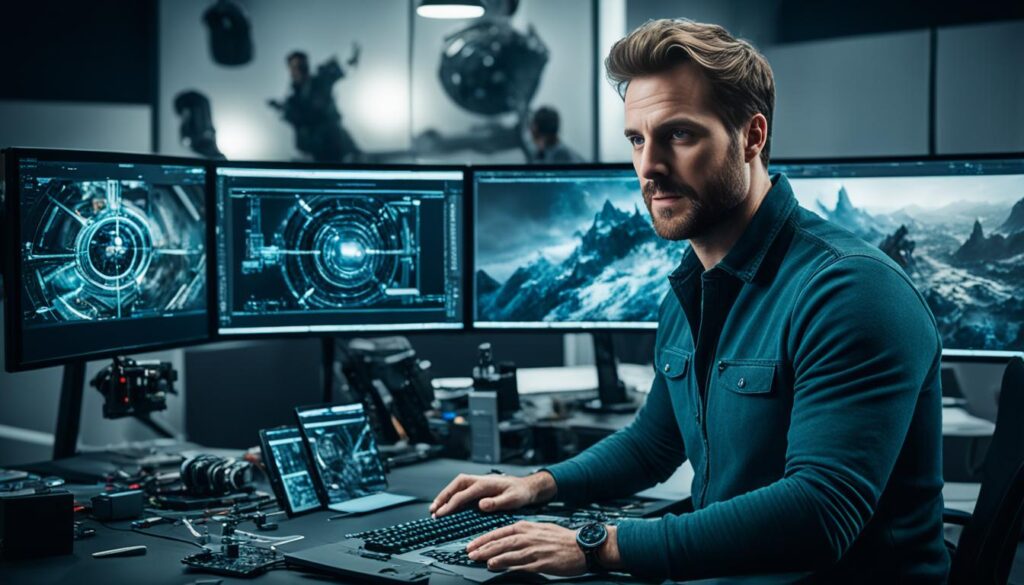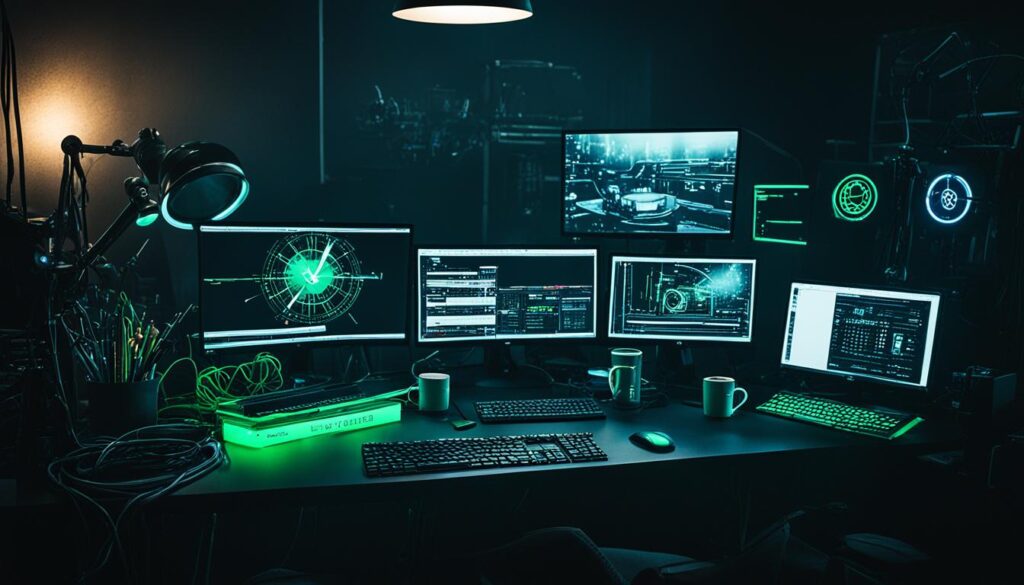
A VFX artist makes special digital pictures for movies, TV, and games. They blend them in with real scenes using special software and tools.
They work on 3D models, animations, and more. Their job is to make things like creatures and special effects look real in films and shows.
VFX artists are key after filming. They turn regular shots into exciting visual stories.
Key Takeaways
- A VFX artist specializes in creating photoreal, digitally-generated imagery for film, television, and gaming.
- They use advanced software and technology to seamlessly integrate visual effects into live-action footage.
- VFX artists are skilled in 3D modeling, compositing, animation, motion graphics, and computer graphics.
- They create realistic digital assets, such as creatures, environments, and special effects, to enhance the visual appeal of films.
- VFX artists play a crucial role in post-production, bringing imagination to life and transforming ordinary footage into captivating visual experiences.
Types of VFX Artist Roles
In VFX, many roles help bring visual effects to life. This includes 2D compositing, merging visuals, and 3D CGI, creating digital worlds. You find people like:
1. Compositing Artist:
A compositing artist blends scenes and effects. They make projects look real and complete. Their work details make images stand out.
2. FX Technical Director (TD):
FX TDs make hard effects look natural. They work on effects like fire and water. Their job is to mix these with real scenes well.
3. FX Animator:
FX animators give effects motion. They bring magic and strange creatures to life. Their work makes stories visually exciting.
4. Multimedia Artist:
Multimedia artists mix graphic design and motion to make stunning visuals. They know how colors and movements tell stories.
5. VFX Supervisor:
A VFX supervisor leads the vision in visual effects. They guide teams to reach the project’s look. This means working closely with the director.
There are many more roles like these in the VFX world. Each role brings special skills to make projects shine. Together, they create amazing visual stories.
Responsibilities of a VFX Artist
Being a VFX artist means you handle many tasks to make top-notch visuals. Meeting deadlines in the VFX world is key. You must be able to manage time well and work quickly under stress.
You get to think up, design, and make awesome special effects. This lets you create cool stuff like particle effects and simulations that wow people.
Working together is a big part of your job. You team up with leads and supervisors to keep things flowing. Clear communication is vital to share your thoughts and ideas well.
Having good organization helps a lot. You have to keep track of the VFX process at every step. This means working closely with other teams to blend the effects perfectly.
Your main aim as a VFX artist is to make effects that make movies better. Paying close attention to detail and pushing to make high-quality stuff is your path to success. You truly help bring stories to life with your visual magic.
Salary of a VFX Artist
Being a VFX artist means your pay can change a lot. This change depends on how much you know and your experience. For starters, you might make between £22,000 and £27,000 a year. If you get more skilled and become a junior VFX artist, your pay goes up to about £30,000 to £38,000. With seven years or more of experience as a senior VFX artist, you could earn over £50,000.
The VFX world has lots of freelancers and often, work is for a set time. This can make pay different project to project. But if you’re really good and have a lot of experience, you could make a lot. This is true whether you’ve just started or you’ve been working for some time. You always have a chance to grow and earn more.
Working Hours and Expectations
Being a VFX artist means long hours and a quick pace. Days start at 9 am and can go late, especially near deadlines. You might need to work some weekends to keep up.
This job requires being flexible and staying calm under pressure. You have to work hard but keep your work top-notch. Staying confident in a busy place is key to doing well as a VFX artist.

VFX artists spend a lot of time making media look amazing. Managing time well and meeting deadlines are crucial. Working closely with your team and keeping in touch are very important.
The chance to turn ideas into reality makes the hard work and sometimes weekend jobs worth it. Creating cool visual effects is rewarding in itself.
Qualifications and Skills Required
Entering the VFX industry doesn’t always demand a degree. Yet, most pros have an HND or a bachelor’s. They study areas like computer animation, graphic design, or multimedia. Art, math, and science, particularly physics and computer science, are useful too. Having a strong portfolio or showreel is key. It shows off your work. Knowing tools like After Effects, Houdini, Maya, and Nuke is a must. And, good communication and organization skills help you work well in a team.
Career Opportunities and Industry Demand
The job field of visual effects (VFX) is full of chances for talented artists in many areas. As the use of VFX in media grows, so does the need for VFX professionals.
In big film cities like London, Cardiff, Bristol, and Belfast, VFX jobs are plentiful. Big movies use VFX a lot to make their scenes and effects amazing, which is crucial for their success.
The gaming world also needs VFX artists. They create the real and exciting worlds and characters in games, drawing players into immersive experiences.
Architecture is now also relying on VFX for creating CGI of buildings and landscapes. This helps architects and builders see their ideas clearly before any building work starts.
On top of that, streaming services like Netflix and Amazon are looking for more VFX. Their original shows use advanced VFX to tell stories in new, captivating ways.
Thanks to tech growth and the need for VFX, the job future is bright for VFX artists. It’s all about keeping up with the latest and always improving your talents to succeed.

Career Opportunities in VFX
| Industry | Opportunities |
|---|---|
| Film Industry | Creating visual effects for movies and TV shows |
| Gaming Industry | Developing realistic and immersive gaming experiences |
| Architecture | Creating computer-generated images (CGI) of buildings |
| Streaming Platforms | Enhancing storytelling with visual effects in media |
Conclusion
A job in VFX lets you work in movies, TV, or games. You get to make cool effects that dazzle people. Using advanced tech, you make dreams real on screen.
To succeed, you need the right skills and a good portfolio. Knowing things like computer animation helps a lot. You also need to be great with software like After Effects and Maya.
This job pays well and has many opportunities. As VFX grows, so does the need for skilled artists. If you love creating digital magic, VFX could be your dream job.
FAQ
What is a VFX artist?
A VFX artist makes amazing images for movies, TV, and games. They are skilled in creating digital scenes that look real. They work with special software to add these effects to real-life videos.
What types of roles do VFX artists have?
VFX artists can be called by many names. Some include compositing artist, FX TD, and VFX animator. Each title shows a different part of the job they do in the VFX world.
What are the responsibilities of a VFX artist?
They make cool digital effects on time and within cost. This can include things like creating particles or big simulations. They work together with leads and supervisors, keep things organized, and talk well with their team.
What is the salary range for a VFX artist?
The pay of a VFX artist changes with experience. Beginners can earn from £22,000 to £27,000. Those with more years in the field might make £30,000 to £38,000. Highly experienced VFX artists can earn £50,000 and more. The pay differs based on the project and how much work is available.
What are the working hours and expectations for a VFX artist?
VFX artists often work long hours, especially when deadlines are near. They might start at 9 a.m. but could work late into the night. Sometimes they have to work on weekends to finish on time and meet the needs of their clients.
What qualifications and skills are required to become a VFX artist?
Most VFX artists have some kind of higher education, like a degree. It’s important to have a strong portfolio of your work. You must know how to use software like After Effects and Maya. Being good at communicating and working in a team is also crucial.
What are the career opportunities and industry demand for VFX artists?
VFX artists can find jobs in movies, TV, games, and architecture. Places like London and Bristol have lots of opportunities in the film industry. Streaming sites are also hiring more VFX artists. Architects need them to create digital images of buildings.
What is the conclusion about being a VFX artist?
VFX artists are key in making movies, TV shows, and games amazing to look at. If you love working with digital art and want an exciting career, this could be great for you. With the right skills, you can find good pay and job opportunities in different fields.


